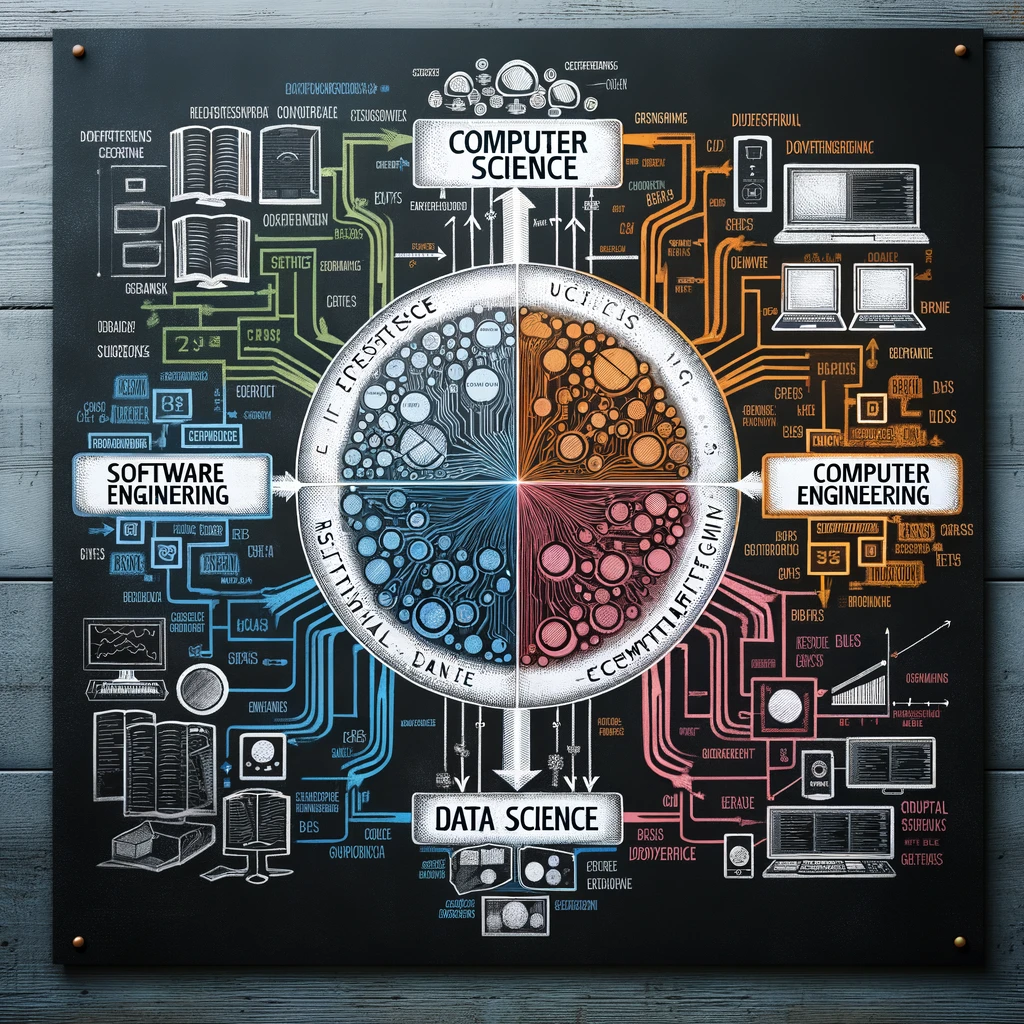What’s the Difference Between Computer Science and Software Engineering? Some confusion exists between these two fields. They are interrelated. Software Engineering is a subset of Computer Science, which is the broader subject. This field covers everything related to computers, technology, and how they work.

We learn theoretical underpinnings of computation and information processing, providing a foundation from which applications can be created. This isn’t just about theory; it’s about a holistic understanding of technological ecosystems.
Then there’s Software Engineering – think of it as the architect and builder of software systems. Focusing intently on the design, development, testing, and maintenance of software, Software Engineers aim to construct robust, scalable, and efficient software systems.
This field is a concentration of the general Computer Science field that focuses on practical application; it’s about turning theory into something tangible that meets the user’s needs.
Choose something that resonates with you — whether it’s the deep-end theory of computation in Computer Science or the hands-on adventure of creating powerful software in Software Engineering.
Your choice will steer your journey into the tech world. Now, let’s dive deeper into what makes Software Engineering a distinct and compelling field of its own.
The Art and Science of Software Engineering
You’re going to find out about Software Engineering as the hands-on approach to technology solutions. This field is all about applying engineering principles to the creation of software, making it a critical component in everything from mobile apps to enterprise software systems. Software Engineers are the architects and builders of the digital world, tasked with turning complex problems into user-friendly solutions.
What sets Software Engineering apart is its emphasis on problem-solving to meet a specific need or to create something entirely new for an industry. The challenges can range from developing a small-scale mobile application to architecting a robust software infrastructure for global corporations.

Not just limited to the creation of new products, Software Engineers also play a pivotal role in maintaining and upgrading existing systems. Career paths in this field can be incredibly diverse. You might aim to become a Web Developer, crafting websites that attract and engage users, or a Mobile App Developer, bringing convenience to people’s fingertips with slick applications. Quality Assurance Engineers ensure software products work as expected, and Database Administrators oversee the effective management of data systems.
Now, a lot is happening very quickly in the world of tech, and Software Engineering is no exception. A noteworthy aspect of the evolving landscape is the rise of artificial intelligence. Future trends indicate software engineers may increasingly serve as overseers guiding AI in writing code. This pivotal shift could redefine what it means to be a software developer and the nature of programming itself.
As I guide you into the next section, keep in mind that Software Engineering isn’t the only avenue for tech enthusiasts. The diverse universe of Computer Science houses many such avenues where professionals can make their mark, and we’re about to explore this broader field next.
Computer Science: The Universal Tech Passport
View Computer Science as your broad-spectrum key to the world of technology. It’s the field that prepares you for a universe rife with digital marvels, focusing less on crafting the software and more on the science behind the tech. You’re going to find out about how a Computer Science degree isn’t just a one-way ticket to becoming a programmer—it’s a passport to various sectors brimming with innovation.
This isn’t just about learning how to code. It’s about grasping the vast expanse of computing, from the theory behind algorithms to the latest advances in artificial intelligence and machine learning. I’m here to help you understand that a career after a Computer Science degree is diverse. It’s loaded with opportunities to innovate, whether in software engineering, data science, or technology strategy.

Your options are hardly limited. A Computer Science degree can catapult you into roles that shape the future—think of positions like a software security architect or business systems analyst. You’re as likely to rub elbows with tech startup visionaries as you are to be the brain behind critical software components in large enterprises.
A Comparative Analysis of Career and Compensation in Tech Fields
In my opinion, navigating the landscape of career opportunities and salaries in Computer Science and Software Engineering reveals compelling insights. The Bureau of Labor Statistics reports that the median salary for software developers stands at a competitive $127,260, which reflects the demand for their skills in designing and implementing software applications.
Digging a bit deeper, if you want to specialize further, consider a master’s in Computer Science. On average, these graduates can command median earnings of $136,62, particularly those venturing into research-intensive roles. This statistic implies that greater specialization and higher education often correspond with increased earning potential.
Now, salary isn’t everything. I firmly believe that job satisfaction and career growth are as important. For instance, the tech industry is keen on professionals who not only deliver results but also drive innovation and adapt to rapidly changing environments. Both fields offer tremendous scope for those who are lifelong learners, showcasing the limitless potential for career development.
Keep in mind, however, that both fields constantly evolve, with new tools and languages emerging regularly. Professionals in these arenas must keep their knowledge base up-to-date through continuous learning. That’s the strategy I like to leverage – advocating for professional development, which in turn cements your status in the ever-competitive job market.
This constant evolution often results in a diverse tech ecosystem where Computer Science generalists and Software Engineering specialists coexist. By understanding the unique yet intersecting paths of these two disciplines, you can choose a direction that resonates with you and aligns with your career ambitions.
The Convergence and Divergence of Fields: Bridging Computer Science and Software Engineering
While these fields have their unique orientations, they’re part of a larger tech ecosystem that includes fields like Computer Engineering, Electrical Engineering, and Data Science. These domains often work in synergy, making it possible to build complex and sophisticated software products. Importantly, success in any of these areas isn’t constrained by your field of study alone; a lifelong commitment to learning and skills adaptation remains a staple for staying relevant.

Whether you’re charting a course to become a Software Engineer or a Computer Scientist, the practical application of your expertise is paramount. For Software Engineers, this means sharpening the ability to design, build, test, and maintain systems, often within collaborative team settings. For Computer Scientists, grounding themselves in theoretical knowledge provides the versatility to engage with, and potentially pioneer, cutting-edge technologies.
Remember, the interplay between these fields is dynamic, with ongoing developments in AI, Machine Learning, and cloud services shaping the trajectories of both professions. In regions where titles like ‘engineer’ are regulated, the distinction carries legal and professional implications, underscoring the need to understand the attributes of each path clearly.
In conclusion, whether you gravitate towards Software Engineering or Computer Science, the most important thing is to choose something that resonates with you. Focus on building a robust skillset that aligns with your passion and career goals. The tech landscape is vast and ever-evolving, presenting immense opportunities for those who are eager to learn and adapt. Stay curious, stay informed, and don’t worry too much about perfection – your journey in tech is bound to be as enriching as it is enlightening.
I have been in the web development industry since 2016. It is my desire to guide aspiring and seasoned developers alike through the complex landscape of web development and software engineering. I combine my academic prowess, with degrees from Western Governor University and a Boot Camp certificate from Bloom Tech, with real-world experience to educate and inspire.
As the force behind DevTuneUp.com, I offer a treasure trove of tutorials, how-tos, and insights into the ever-evolving tech industry. With a sharp focus on demystifying technology and a goal to make DevTuneUp.com a cornerstone for tech enthusiasts, I leverage my expertise in SEO optimization and social media marketing to reach and empower a global audience. Join me on this journey to navigate the digital world with confidence and skill.
My sister just obtained her master’s degree in Computer Science, I used to tell people that she was like a coder, and she eloquently corrected me over dinner one evening. She broke it down as much as she could for me, explaining that she makes it possible for computers to understand the codes and programs.
My brother has dabbled in software engineering a bit here and there. As far as I know, he never earned a degree, but he is a genius, to say the least.
I learned the difference in these fields from them, and also how much they go hand-in-hand. I never caught onto that part of the computer world, I do customer service for one of the largest hardware/software developers in the world, troubleshooting their apps and whatnot, but nothing serious like my siblings.
I found this article to be very interesting as getting a little deeper look at what they do, gives me more perspective on their careers. I do find it interesting that we all ended up working in the computer field of some form.
Thanks for this insightful article on the difference between computer science and software engineering.
Stacie
Hey, great article on the distinction between software engineering and computer science. I think this could be helpful both for those looking to potentially enter either field, or just for those who are curious in general. I like that you pointed out software engineers also upkeep/maintain existing applications and software instead of just constantly developing. I always sort of pictures software engineers as constantly coming up with new software, but the way you described it makes more sense ha. Thanks for sharing.
Your comparison between computer science and software engineering is insightful. Understanding the distinctions between the two fields is crucial for students and professionals alike. However, I wonder how much overlap there is between the two disciplines in practice. Do you think professionals in one field can easily transition to the other?
As someone with a background in computer science, I’ve often pondered the practical applications of my theoretical knowledge in software engineering roles. Your article sheds light on the different focuses of each field, which can help individuals make more informed career decisions. Thank you for breaking down these complex subjects in such a clear and understandable manner!
Computer Science is a lot more academic, so switching roles to the academic side would require more theoretical understanding. A lot of engineers have some though.
S witching from computer science to software engineering, is a lot easier because you already have the theoretical concepts that will make you a good engineer.
This insightful article effectively clarifies the distinctions between Computer Science and Software Engineering, providing a valuable guide for those navigating the tech landscape. The analogy of Computer Science as a universal passport to the world of technology, emphasizing theoretical foundations and diverse career opportunities, is particularly illuminating. The exploration of the convergence and divergence of tech fields, including Computer Science, Software Engineering, and others, offers a holistic perspective on the interconnected nature of the tech ecosystem. The call to stay curious, informed, and adaptable resonates as a valuable piece of advice for anyone embarking on a journey in the ever-evolving field of technology. Well done for providing such a comprehensive and insightful overview!
Hi Jordan,
I just went through your article on the differences between Computer Science and Software Engineering. Your breakdown was spot on, especially highlighting how each field has its unique orientation within the tech ecosystem. However, I noticed the emphasis on the theoretical vs. practical application, which got me thinking. Given the rapid technological advancements and the blending of disciplines, do you think the lines between Computer Science and Software Engineering will further blur in the future? How should students and professionals prepare for this evolving landscape to ensure they remain relevant?
Thank you for your work and sharing your knowledge.
Best regards,
Makhsud
Hi Makhsud,
Thank you so much for your thoughtful comment and for engaging with the article. I’m thrilled to hear that you found the breakdown between Computer Science and Software Engineering insightful.
You’ve raised an excellent point about the convergence of disciplines, especially in the face of rapid technological advancements. Indeed, the lines between Computer Science (CS) and Software Engineering (SE) are becoming increasingly blurred. This trend is likely to continue as both fields evolve and as the tech industry demands more versatile skill sets.
In this evolving landscape, it’s crucial for both students and professionals to foster a mindset of continuous learning and adaptability. Here are a few strategies to stay relevant and thrive:
Cross-disciplinary Learning: While specializing in one area, it’s beneficial to gain a foundational understanding of the other. For instance, a software engineer might benefit from understanding computational theories, while a computer scientist could enhance their practical skills in software development.Stay Updated: The tech field is dynamic, with new tools, languages, and methodologies emerging regularly. Engaging with professional communities, attending workshops, and enrolling in courses can help in staying current with the latest trends.Soft Skills and Collaboration: As the boundaries between disciplines blur, teamwork and communication become even more crucial. Developing soft skills can facilitate effective collaboration in multidisciplinary teams.Innovation and Creativity: Encourage thinking outside the box. The unique blend of theoretical knowledge and practical application can lead to innovative solutions to complex problems.Ethical Consideration and Lifelong Learning: As technology integrates deeper into society, understanding the ethical implications of tech developments is crucial. Additionally, adopting a lifelong learning approach ensures that one’s skills and knowledge continue to align with the industry’s needs.
Your question touches on the core of how education and professional development might adapt to the future of the tech industry. It’s an exciting time to be part of this field, and the convergence of CS and SE can indeed open new horizons for innovation and growth.
Thank you once again for your insightful question and for your kind words about the article. It’s interactions like these that enrich the discourse and contribute to the collective growth of our field.
Best regards,
Jordan
Hey